- Home
- Karen Traviss
Matriarch Page 6
Matriarch Read online
Page 6
Shit, he loved her. He loved her because she was scary and always knew what to do when things went pear-shaped. She had a nice arse, too.
He wondered how angry she could get with him; she’d kicked the shit out of Rayat, but it wasn’t physical pain he dreaded, just rejection. Whatever it took to get back in her good books, he’d do it.
Shan didn’t meet his eyes as she walked. She drew level with him, hands thrust in her pockets, and then stopped to stare at his hair.
“Needs cutting,” she said. “I never realized you had curly hair.”
Ade ran his hand self-consciously across his head, wiping away beads of water. He needed to take the clippers to it. “Sorry. You told Esganikan about Bezer’ej?”
“Yes. She doesn’t seem to give a toss. Funny, isn’t it? I expected her to go barmy.”
“Oh.” Shan was doing her slow burn. He preferred it when she just blew up and got it over with. He always thought he knew what her flash-to-bang time was. “You give a shit, though, Boss.”
“Oh yeah.”
“What are you going to do?”
“Do what I used to do in EnHaz, I suppose—assess the risk and contain it. Something tells me I ought to go and finish the job, but I’m not sure how to carry out a detonation under water.”
“I meant about me and Aras.”
“Ah. That.” Shan looked carefully blank. “Continue feeling pissed off and let down, and work out why.” She started walking and he followed her. It was worse than a punch in the face, and he’d had a few of those. She had her detached copper’s voice on now, the one that he knew she used when dealing with those who meant nothing to her. “See, Ade, I don’t know if I’m pissed off because you did something I spaced myself to avoid doing, or because you and Aras competed to see who could run out on me the fastest, or because you created a major environmental hazard. When I work that out, then I’ll decide how fucking angry I’ll be.”
Ade wanted to make things simple for her. He wanted to stop her feeling obliged to take him on just because she’d infected him by accident. He wanted her to have a happy life at last with Aras, whether that included him or not.
“I thought I was in the way, Boss.”
“I’ll tell you when you’re in the way. Okay?”
They walked on through the damp gleaming alleys and up the narrow steps cut into the rock. He couldn’t bear the cold silence and tried to force a conversation.
“Boss, whatever you decide to do, I’ll help you sort it.”
“I don’t know what to do. That happens sometimes. I don’t have all the answers.”
“What would you have done differently?”
She didn’t even pause for breath. “Dumped those two bastards in the water and let them drown.”
“Even if the bezeri asked for someone to stay with them?” If either of us sleep with her, c’naatat will transfer our memories. She’ll find out about Aras anyway. I might as well get that over with, too. “They asked Aras to stay with them weeks ago. He was in a right state about it.”
“Oh, and he never thought to mention it to me? Fucking great.”
“There were things you didn’t tell him, remember? Like being the DNA donor for the bioweapon?”
“Yeah. There’s nothing wrong with my recall.”
“And…” Ade wasn’t arguing with her, he was sure of that. She’d let the wess’har use her DNA to create the pathogen that would kill any human who set foot on Bezer’ej. She’d left Aras to grieve. He just wanted her to see how decisions got made, and that she made them the same way. “You ran out on him, in a way.”
“I did.” Her voice dropped. “But I still didn’t hand over c’naatat.”
“Yeah, but you still infected me, accidentally or not.”
“I nutted you after you emptied a frigging clip into me.”
“But motive doesn’t matter, does it? That’s the wess’har way.”
“Yeah. I sucked vacuum for months thanks to you, but I’m all better now, so no harm done, eh?”
Oh shit. “Boss—”
“Just piss off or shut up. You choose.”
Shan’s coat flapped as she climbed ahead of him in silence. The caldera echoed with the thud of boots and the occasional double warbling note of wess’har females making that territorial call that unnerved him. Even Nevyan did it. It was very animal. Ade felt suddenly crushed and alone.
I’ve fucked this up completely. How do I get her to even like me again?
He followed her into the house. Aras was grinding soybeans to extract the milk and a smell like wet cardboard filled the room. He looked up and then carried on with his task using one of the hand-mills that had once been used in Constantine.
“I’m going to Umeh tomorrow for a few days,” Shan said. “But I’m not sure if I want to leave you two buggers on your own. I can’t trust you.”
“Take Ade,” said Aras.
“You got a reason for staying here?”
Aras held up the bowl of beans. “A great deal of soy to process. And Black is unwell.”
Black and White were two of the lab rats that Aras had seized from Rayat back on Bezer’ej, in the days when he just seemed to be an irritating scientist in need of a good hiding to make him understand what no meant. That was two years ago: Black and White were now old and frail. Aras was fond of them. All animals were people to him.
Shan cast a glance at the cage on the storage cabinet. “I want your word on that.”
Aras tipped the pulverized beans into a sieve and let the milky liquid run through into a bowl. “I’ll still be here when you get back.”
“If you’re not,” she said, “don’t expect me to come running after you.”
She disappeared into the room she shared with Aras and didn’t close the door. Ade could hear the snap of fabric and the ripping sound of her grip being opened. She was packing.
He glanced at Aras with the solidarity of a brother. “At least she hasn’t kicked us out. That’s a start.”
Aras shrugged just like a human. It was almost possible to forget that he’d started life as a wess’har. “If you accompany her to Umeh, it gives you some private time to copulate with her. She may well take a less hostile view when she’s bonded with you.”
Ade winced. There was crude, and then there was cold. Aras was still wess’har at heart, and they were now in the odd world of wess’har genetic transfer, where females and males passed DNA across membranes and changed each other at the cellular level. C’naatat was almost made for wess’har. But Ade didn’t see sex like that at all. He just wanted Shan, and the idea that she would be bonded to him simply because they swapped genes felt grim and soulless. He wanted her to choose him. He wanted her to love him.
“I’ll let you know if I come back with my nuts intact,” said Ade. “That’s probably the best I can hope for.”
“I expect c’naatat could grow them again,” Aras said, and Ade was—as ever—unsure if he was joking or being scrupulously wess’har-literal.
Ade didn’t have Eddie’s gift of the gab, and Shan was immune to flattery anyway. He had to deal with her like a bloke. No crap. Just the facts. She’d eat him alive if he tried to cajole her.
The bedroom door opened. Shan stood with her fists on her hips and for a moment Ade braced for a broadside. She’d heard them. Coppers had some uncanny natural radar. Her lips parted.
“There’s one thing I want to say to you two,” she said. Her face was drained of blood, made even whiter by the contrast with her black hair, and she’d obviously been chewing over the earlier conversations. “Loyalty. You can do what the fuck you like, but there’s one thing I demand from you two and that’s loyalty. You do not go behind my back. You do not decide what’s best for me. Is that clear?”
Ade nodded, silent. “Yes, isan,” said Aras.
She didn’t have to say she was the Guv’nor. Ade was glad she was, and he knew Aras liked it that way too. Wess’har matriarchs ran the show. A female who could punch her own weight
and then some was normal here; but it was still both sobering and arousing to stand within striking distance of that kind of dominance.
Shan stared at them for a few moments as if she was going to say something else, then turned and went back into the bedroom, where she packed audibly. Given how little she carried with her, she took a long time doing it.
“’Ras, show me how to do that soybean thing,” said Ade, looking for diversion. A Royal Marine could do anything. He’d make soy milk and tofu and even bloody cakes if he had to. “Might as well be useful.”
It was a silent and awkward day, and an uncommunicative evening.
That night, Shan slept on the sofa.
Bezer’ej: continental shelf, Ouzhari
Lindsay Neville fumbled with the signal lamp, kneeling in the cold mud, now able to detect everything around her for some distance.
She couldn’t call it seeing. She could detect light and she could see a lot better than she should have been able to in these black depths, but she could also visualize contours and densities and movement. She had no idea how; she had an urge to open her mouth wide, and somehow images were forming in her mind. At first they had reminded her of grainy reproductions of carved reliefs, but now they were much sharper. She could detect fine detail.
She could see Mohan Rayat, sitting on the seabed and groping around him as if he wasn’t sure where he was.
Oh my god oh my god oh my god I’ve changed into something else and I’m not me anymore and—
Rayat put his hand to his neck.
He had gills.
Lindsay had to know. She knew before she touched her throat but it was still a shock when her fingertips—cold, but not numb—felt soft unfamiliar spaces under her jaw.
She felt her lips part in a reflex that would have been a yelp of shock but it never emerged. She let her arm drop to her side and found she was still clutching the signal lamp. Would she always need it to talk to the bezeri? Might she develop the bioluminescence, and then the language?
I won’t be human then. What am I now, anyway?
She put eternity out of her mind. Even planets died in the end, and their oceans with them.
Great billowing shapes with tentacles trailing moved towards her in pulsing movements, propeling themselves with jets of water. They settled in a semicircle, translucent and yet a complex sac of dense tissue filled with voids of varying sizes, rippling pinpoints of colors through their mantles in dazzling patterns.
Lindsay activated the signal lamp and held it up.
At first she heard random chatter booming from the device as it picked up and translated the light patterns from the bezeri. Then she moved it so that it was facing straight at one of the creatures.
You never thought what your bombs would do to us.
Lindsay’s brain merged the multilayered image of light and density and faint electrical impulses. Is this how Shan sees things? She chose her words carefully.
“I didn’t know they contained cobalt. I’m truly sorry.”
The lamp flared a sequence of colors. There was no way of knowing how well it translated.
We may not survive even now. There are too few of us.
Lindsay was aware of movement behind her. Rayat was picking his way through the mud, trying to balance in unfamiliar terrain and currents.
“We’ll help you,” she said. The lamp projected her words. “Give us a chance.”
“Give me the lamp,” said Rayat.
“Sod off. I’ll do the talking.” She focused on the bezeri again. Concentrating kept her panic under control. It stopped her thinking about what was happening to her and what would happen for an unimaginable time to come. “What do I call you?”
You will retrieve our archives and help us preserve them. They are all we have left. If we die out, then at least we leave some existence behind us.
Perhaps they hadn’t understood. “Do you use names? I’m Lindsay Neville.”
Eeeenz.
It took Lindsay a few moments to grasp what the bezeri was saying. It was trying to pronounce her name.
“Lindsay,” she repeated.
Leeenz.
“Yes. Leenz.”
Saib.
“Saib.” Lindsay repeated it. “Saib.”
I am a patriarch. My children are dead.
“My child is dead, too,” said Lindsay. David, premature David, who would have survived if Shan had given him a little of her altered blood. “I can understand that much.”
How will you eat?
Rayat cut in. “C’naatat will enable us to digest anything, I’m sure of that.”
The lamp didn’t translate; Rayat was beyond the range of the mike. Lindsay hadn’t even thought about the daily routine of life, and the fact she had overlooked that appalled her. She had to get a grip.
Could you starve to death if you carried c’naatat? Shan survived months drifting in space without a suit; Lindsay didn’t want to test what c’naatat could force her to survive at this depth. And as soon as she thought of that, she remembered something that she was sure she’d never experienced.
A gorilla reached out with its leather glove of a hand, staring her in the eye, and withdrew. Then it rubbed its palm in a circular motion over its chest followed by a fist-on-palm gesture, over and over again. Lindsay felt shame and regret so overwhelming that it made her shut her eyes involuntarily, but it wasn’t her memory.
It was Shan’s. Eddie had told her about it: the gorilla was asking for help, but Shan hadn’t understood until years later. It haunted her.
I don’t want your memories but you’re welcome to mine. That’s what Ade had said when he transferred the parasite to her, making sure her blood didn’t contaminate his. Genetic memory; another little add-on that c’naatat had picked up along the way. Lindsay had no idea what alien memories would surface in her, and that was an extra layer of the nightmare she had to deal with.
But it was a fitting punishment for bringing a species almost to extinction. And, unlike those who had wiped out the dodo and the tiger and the orangutan, she was now at the mercy of her victims.
Shan would have told her that it served her bloody well right.
Saib seemed impatient. We have many records to gather. They are scattered all over this region. He shimmered with pulsing violet rings of light and began to move away. Three others moved with him, one a constant, unchanging deep blue, the other a slowly changing palette of scarlet and green that lost its red hues as it moved further away. We have to hurry.
Lindsay didn’t ask why. She began walking behind Saib and his companions as if she was trudging through deep snow, still trying to walk when she should have been swimming. “Come on, Rayat. Do as you’re bloody told.”
“It’s going to be something like raw shrimp and jellyfish,” he said.
She swayed a little and then found herself striking out, lifting her legs, swimming.
“What is?”
“Lunch.”
Lindsay wondered how she was going to spend eternity trapped with Rayat. Concentrating on familiar loathing stopped her thinking about what she was becoming, and how she would get through the next hour without going insane.
Jejeno city, Ebj region, Umeh: Eqbas Vorhi ship 886-001-005-6, Ebj airspace
“Shit,” said Shan.
It was the first time she’d seen Umeh and it was every nightmare she’d ever had in Environmental Hazard Enforcement. The Eqbas ship hung about 1,000 meters above the surface of the city. Then its forward bulkhead and part of the deck became suddenly transparent.
She put her hand out instinctively to steady herself. She felt like she was falling; she’d done this before. She’d stared down through the viewplate of an automated shuttle as it plummeted towards the surface of Bezer’ej for the first time and the sensation made her nearly throw up.
For a second, she was close to doing that again.
Tight-packed buildings spread below her. There was nothing else but buildings upon buildings upon buildings, withou
t the relief of greenery or open spaces or bodies of water. She’d seen Eddie’s footage of Jejeno but it didn’t come close to capturing the sheer scale of the urbanization.
Home, said an uninvited feeling in her chest. Home.
She tagged it as the scrap of isenj in her that went with the genetic memory. The movement she could see was packed bodies, a black and brown carpet of isenj moving through the impossibly crowded streets of the capital. That was inside her, somewhere.
“Shit,” she said again. Crowded cities meant high casualties in any disaster; unthinkably crowded ones like Jejeno set off all her copper’s emergency responses. She braced herself not to attempt to organize things. “Remind me not to apply for a posting here. How the hell do they manage an environment like that?”
At least the deck was mostly opaque. Where it was wholly transparent, an Eqbas crew member gazed down apparently unconcerned. Shan decided that she could manage that too, and steeled herself to step into the transparent section to look down, overriding all her brain’s hardwired insistence that she would fall.
Eddie joined her in contemplating the city beneath their feet, as casual as the Eqbas. His bee cam—the size of a small orange—settled a little above the deck, recording silently. Shan wondered if Eddie was putting on a show of bravado when he was actually shitting himself. Looking down on the city, she felt like a tourist in Hell.
“I can remember when this was all fields,” Eddie said cheerfully.
Ade chuckled. He hadn’t said a word since they embarked. Shan wondered how she could call a truce with him now and waited for Eddie’s reaction.
“Who do you actually know in the isenj government now, Eddie?” You got Ual killed, you tosser. That’s what happens when you play at politics. “Any favors to call in?”
He shrugged. If he felt any responsibility for his part in Ual’s death, he was doing a good job of hiding it. She suspected he was. “Ralassi. Ual’s aide.”
“Well, at least we’ll get a cup of coffee, then.”
“I’m good at making contacts. Trust my charm.”
Shan could see Serrimissani and Aitassi talking to Esganikan in her peripheral vision. Ussissi were scrupulously neutral; they might have evolved alongside the wess’har on Eqbas Vorhi, but they also moved across the galaxy with them, and they saw no conflict of interests in working for the isenj on Umeh. Neither did the wess’har. Ussissi didn’t take sides and wess’har were completely comfortable with that. It was a political and social concept that defeated most humans, and Shan wasn’t sure she grasped it herself.

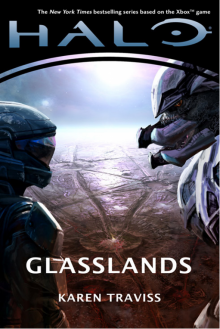 Halo: Glasslands
Halo: Glasslands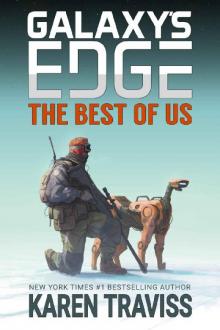 The Best of Us
The Best of Us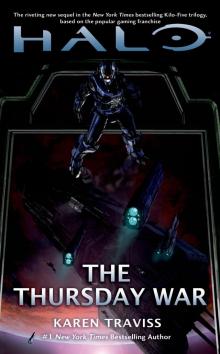 Halo: The Thursday War
Halo: The Thursday War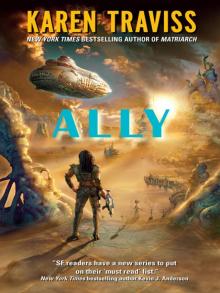 Ally
Ally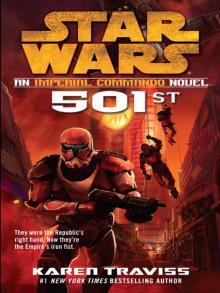 501st: An Imperial Commando Novel
501st: An Imperial Commando Novel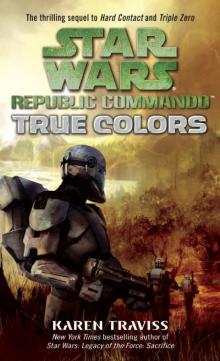 True Colors
True Colors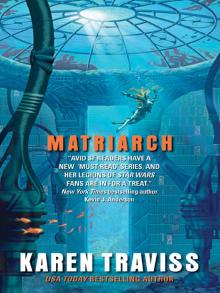 Matriarch
Matriarch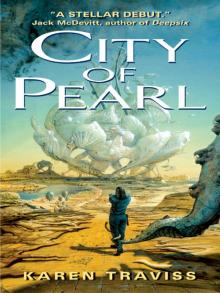 City of Pearl
City of Pearl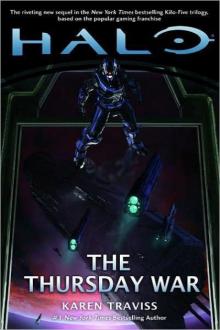 The Thursday War
The Thursday War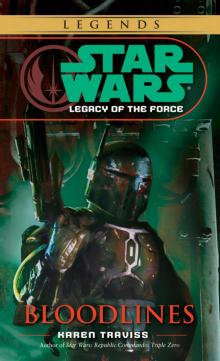 Bloodlines
Bloodlines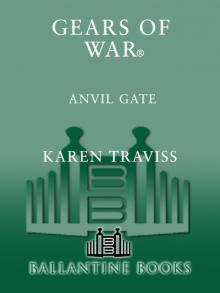 Gears of War: Anvil Gate
Gears of War: Anvil Gate Crossing the Line
Crossing the Line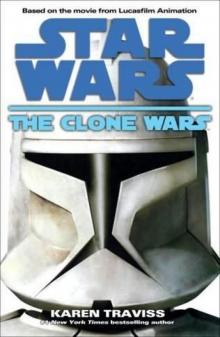 Star Wars - The Clone Wars 01
Star Wars - The Clone Wars 01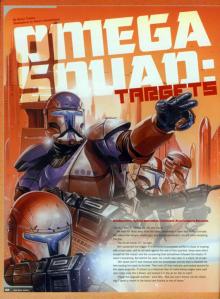 Omega Squad: Targets
Omega Squad: Targets Halo®: Mortal Dictata
Halo®: Mortal Dictata Hard Contact
Hard Contact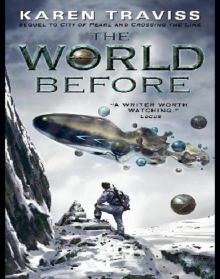 The World Before
The World Before Order 66
Order 66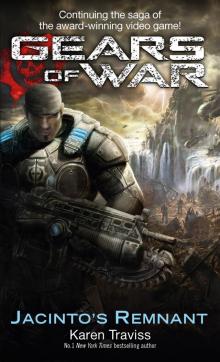 Gears of War: Jacinto's Remnant
Gears of War: Jacinto's Remnant Sacrifice
Sacrifice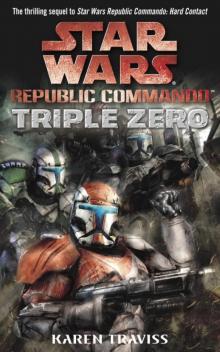 Triple Zero
Triple Zero Gears of War: The Slab (Gears of War 5)
Gears of War: The Slab (Gears of War 5)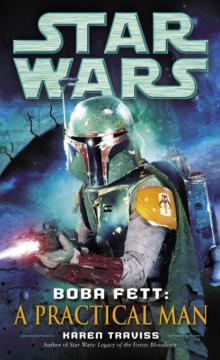 NEW JEDI ORDER: BOBA FETT: A PRACTICAL MAN
NEW JEDI ORDER: BOBA FETT: A PRACTICAL MAN Going Grey
Going Grey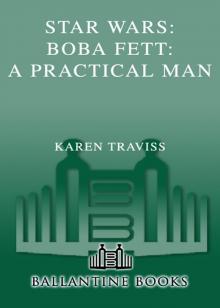 Star Wars: Boba Fett: A Practical Man
Star Wars: Boba Fett: A Practical Man Revelation
Revelation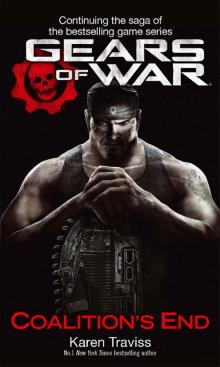 Coalition's End
Coalition's End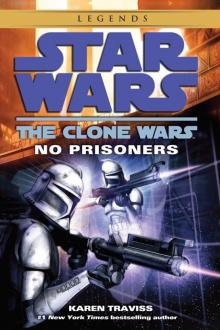 No Prisoners
No Prisoners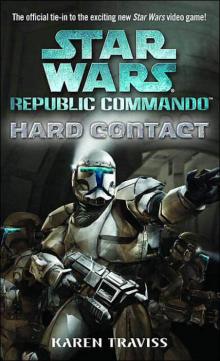 Star Wars Republic Commando: Hard Contact
Star Wars Republic Commando: Hard Contact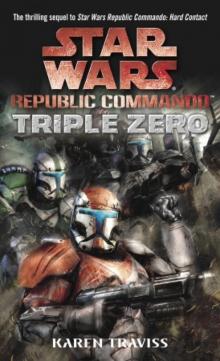 Star Wars: Republic Commando: Triple Zero rc-3
Star Wars: Republic Commando: Triple Zero rc-3 The Clone Wars
The Clone Wars The Clone Wars: No Prisoners
The Clone Wars: No Prisoners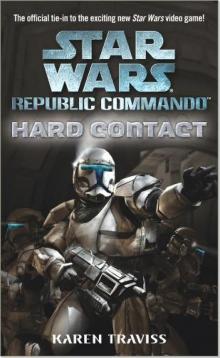 Star Wars: Republic Commando: Hard Contact rc-1
Star Wars: Republic Commando: Hard Contact rc-1 Judge
Judge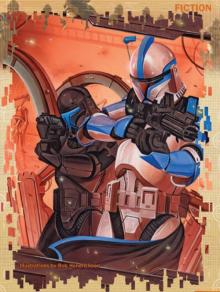 Omega Squad: Targets rc-4
Omega Squad: Targets rc-4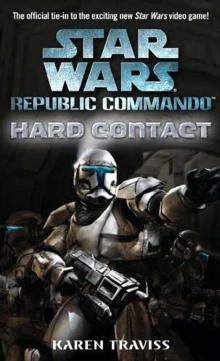 Star Wars - Republic Commando - Hard Contact
Star Wars - Republic Commando - Hard Contact